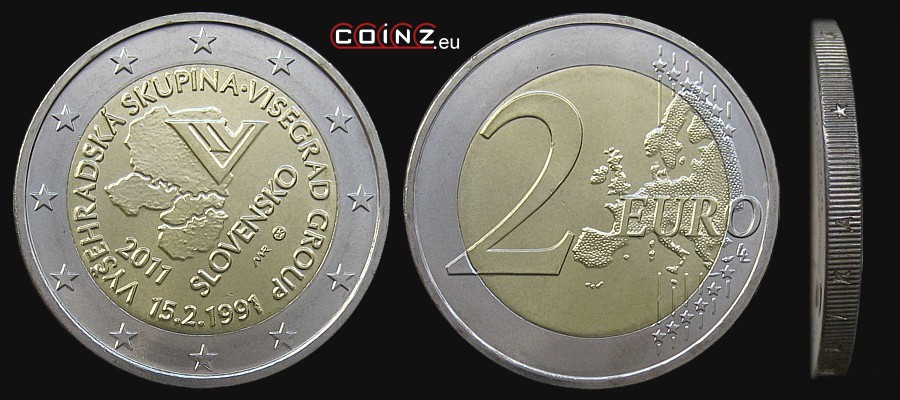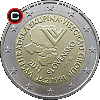2 euro SLOVAKIA (2011) 20 Years of Visegrad Group


| diameter: | weight: | thickness: | alloy: |
| 25.75 mm | 8.5 g | 2.22 mm | Cu75Ni25/Cu75Zn20Ni5 |
obverse:
above the coin centre a letter V with a Roman numeral IV composed into it (symbol of the Visegrad Four); in the background
schematic maps of Poland, Czech Republic, Slovakia and Hungary; below on the left diagonally year of issue 2011, on the right
diagonally: SLOVENSKO (Slovakia); along the top edge: VYŠEHRADSKÁ SKUPINA • VISEGRAD GROUP (Visegrad Group
in Slovak and English); along the bottom edge date: 15.2.1991; at the edge a ring of twelve five-pointed stars -
symbol of the European Union
reverse:
edge:
reeded with concave inscription: 
SLOVENSKÁ REPUBLIKA (Slovak Republic and two five-pointed stars divided by a lime leaf)

SLOVENSKÁ REPUBLIKA (Slovak Republic and two five-pointed stars divided by a lime leaf)
issue date:
10 I 2011
withdrawal date:
still in circulation
designer:
Miroslav Rónai (initials MR diagonally below SLOVENSKO on the obverse), Luc Luycx (initials LL below letter 'O' in EURO on the reverse)
mint:
 Mincovňa Kremnica (Kremnica Mint), Kremnica (mint mark diagonally below SLOVENSKO on the obverse)
Mincovňa Kremnica (Kremnica Mint), Kremnica (mint mark diagonally below SLOVENSKO on the obverse)
mintage:
| 2011 | 981 0000 | + 12 000 in boxed annual sets + 7 000 in boxed coincards |
interesting facts:
In 1335 in the castle of Visegrád, in the Kingdom of Hungary a meeting took place, where King of Poland – Casimir III the Great,
King of Bohemia - John the Blind and King of Hungary - Charles Robert decided to tie a "never-ending" political and military alliance.
This event inspired young post-communist democracies - Poland, Czechoslovakia and Hungary, who have agreed to meet in the same
place to establish another diplomatic alliance. On February 15, 1991 the leaders of these three countries met in Visegrád and
agreed on principles of cooperation to achieve common goals, which were at this time the membership of the NATO and of the
European Economic Community, transformed into the European Union. The Visegrad Three became Four in 1993 after the split of
Czechoslovakia and since then the group has been informally abbreviated V4. Despite achieving their objectives in 1999 (joining NATO) and
2004 (joining EU) the Visegrad Group sets further common targets and co-operate to this day.
last update: 14 X 2012
coins catalogue :: katalog monet :: münzkatalog :: catalogue de monnaies :: catálogo de monedas :: catalogo monete :: каталог монет :: κέρματα κατάλογος :: COINZ.eu
© 2010-2025 :: Adam Kubicki :: COINZ.eu :: All rights reserved.


